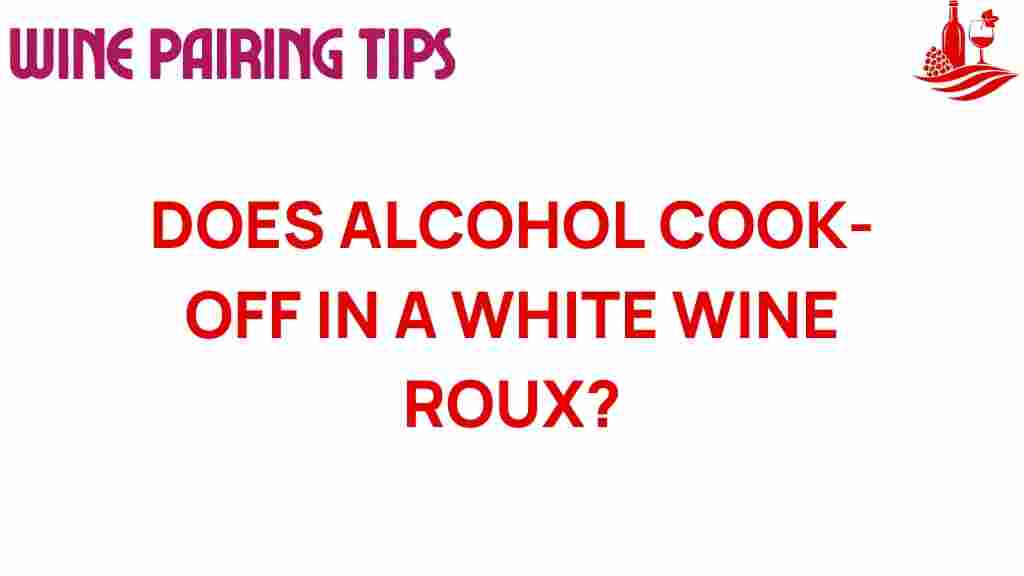Unraveling the Mystery: Does Alcohol Cook Off in White Wine Roux?
When it comes to cooking, the use of alcohol, particularly white wine, has become a staple in many culinary recipes. One common question that arises is whether the alcohol in white wine roux cooks off completely during the cooking process. In this article, we will delve into the science of cooking with alcohol, the role of white wine in a roux, and how it affects flavor, evaporation, and ultimately, your dishes.
Understanding Roux in Culinary Science
A roux is a mixture of fat and flour that is used as a thickening agent in sauces, soups, and gravies. It forms the foundation for many classic dishes, including béchamel and gumbo. The traditional roux is made with equal parts of fat (like butter) and flour, cooked together until they form a paste. However, when you introduce white wine into the equation, the dynamics change.
- Flavor Enhancement: White wine adds depth and complexity to the flavor of the roux.
- Acidity Balance: The acidity in white wine helps balance the richness of the fat.
- Color and Aroma: Cooking with white wine can enhance the visual appeal and aroma of the dish.
However, the most significant question remains: what happens to the alcohol in white wine when it is added to a roux?
The Science Behind Alcohol Evaporation
Alcohol has a lower boiling point than water, which means it evaporates more quickly during the cooking process. When cooking with white wine in a roux, the alcohol begins to evaporate as soon as it is heated. However, several factors affect how much alcohol remains in the final dish:
- Cooking Time: The longer you cook the roux with white wine, the more alcohol will evaporate.
- Temperature: Higher temperatures facilitate faster evaporation of alcohol.
- Surface Area: A wider pan allows for more evaporation compared to a smaller, covered pot.
Research suggests that while a significant portion of alcohol can evaporate during cooking, it is unlikely to cook off entirely, especially if the dish is not cooked for an extended period.
How to Cook Off Alcohol in White Wine Roux
If you’re concerned about the alcohol content in your cooking, here’s a step-by-step guide to ensuring most of it evaporates:
- Start with a Hot Pan: Heat your pan before adding the fat and flour. This helps initiate the evaporation of alcohol as soon as the white wine is added.
- Add the Roux Ingredients: Melt butter or oil, then whisk in flour until combined. Cook for a few minutes to develop the roux’s flavor.
- Introduce White Wine Gradually: Pour in the white wine slowly while stirring. This allows for even distribution and quicker evaporation.
- Increase the Heat: Raise the heat to a simmer. The bubbling action will help evaporate the alcohol more efficiently.
- Simmer for at Least 10 Minutes: Allow the mixture to simmer for at least 10–15 minutes, stirring frequently. This duration will help reduce the alcohol content significantly.
- Check Consistency: Continue cooking until the roux reaches your desired consistency and flavor.
Flavor Considerations
While cooking off the alcohol, it’s essential to consider the overall flavor profile of your dish. The white wine contributes more than just alcohol; it adds acidity and complexity. Here are some tips to maintain flavor while ensuring alcohol cooks off:
- Use Quality Wine: Choose a dry white wine that you enjoy drinking, as its flavor will be concentrated in the dish.
- Balance Acidity: If too much alcohol evaporates, you may want to balance the flavor with a splash of vinegar or lemon juice.
- Adjust Seasoning: Taste your dish as you go and adjust seasonings accordingly to maintain a well-rounded flavor.
Common Troubleshooting Tips
Even experienced cooks may run into issues when working with white wine roux. Here are some common problems and how to solve them:
- Too Much Alcohol Flavor: If you notice a strong alcohol taste, continue simmering longer to let it evaporate, or add additional ingredients to balance the flavor.
- Roux Not Thickening: If your roux is too thin, allow it to cook longer to reduce the liquid, or gradually whisk in more flour.
- Burnt Roux: If you notice the roux is browning too quickly, reduce the heat and stir more frequently to prevent burning.
Delicious Recipes Using White Wine Roux
Now that you understand how to effectively cook off alcohol in white wine roux, here are a few recipes where this technique shines:
- Classic Chicken Fricassée: A creamy chicken dish made with a white wine roux, perfect for a comforting dinner.
- Seafood Gumbo: A flavorful stew that benefits from the depth of flavor provided by white wine in the roux.
- White Wine Alfredo Sauce: A rich and creamy pasta sauce that uses a white wine roux for added flavor complexity.
For more recipes, check out this culinary resource that specializes in gourmet cooking techniques.
Conclusion
In conclusion, while alcohol in white wine roux does evaporate during cooking, it may not cook off entirely. By understanding the science of evaporation and following practical cooking methods, you can significantly reduce the alcohol content while benefiting from the rich flavors that white wine brings to your dishes. Remember to adjust your recipes based on personal preferences and dietary needs. Happy cooking!
For more kitchen tips, visit our cooking blog for insights, recipes, and culinary science discussions.
This article is in the category Tips and created by Wine Pairing Tips Team
